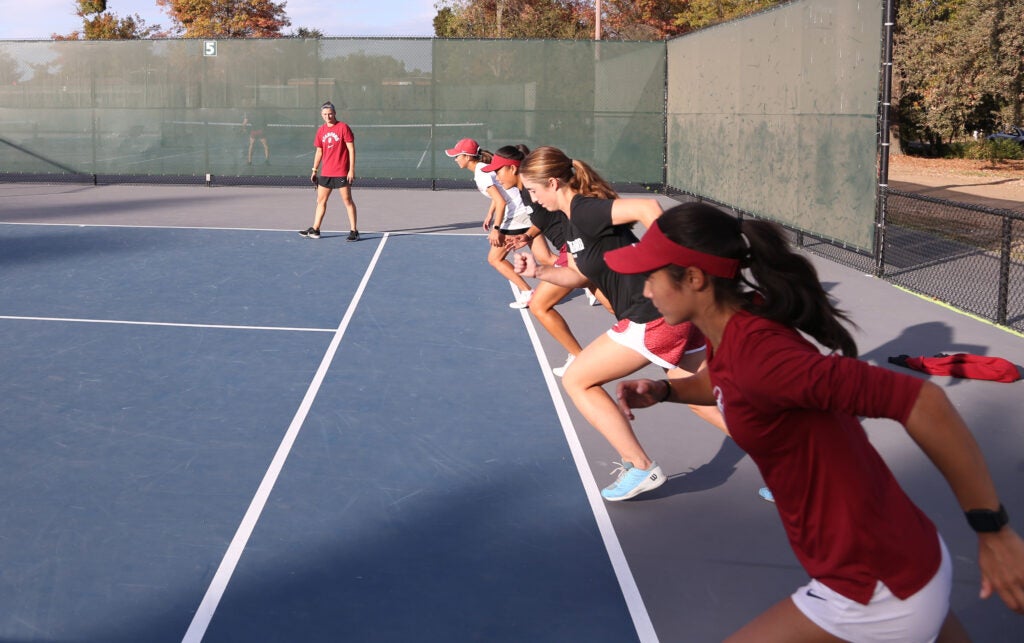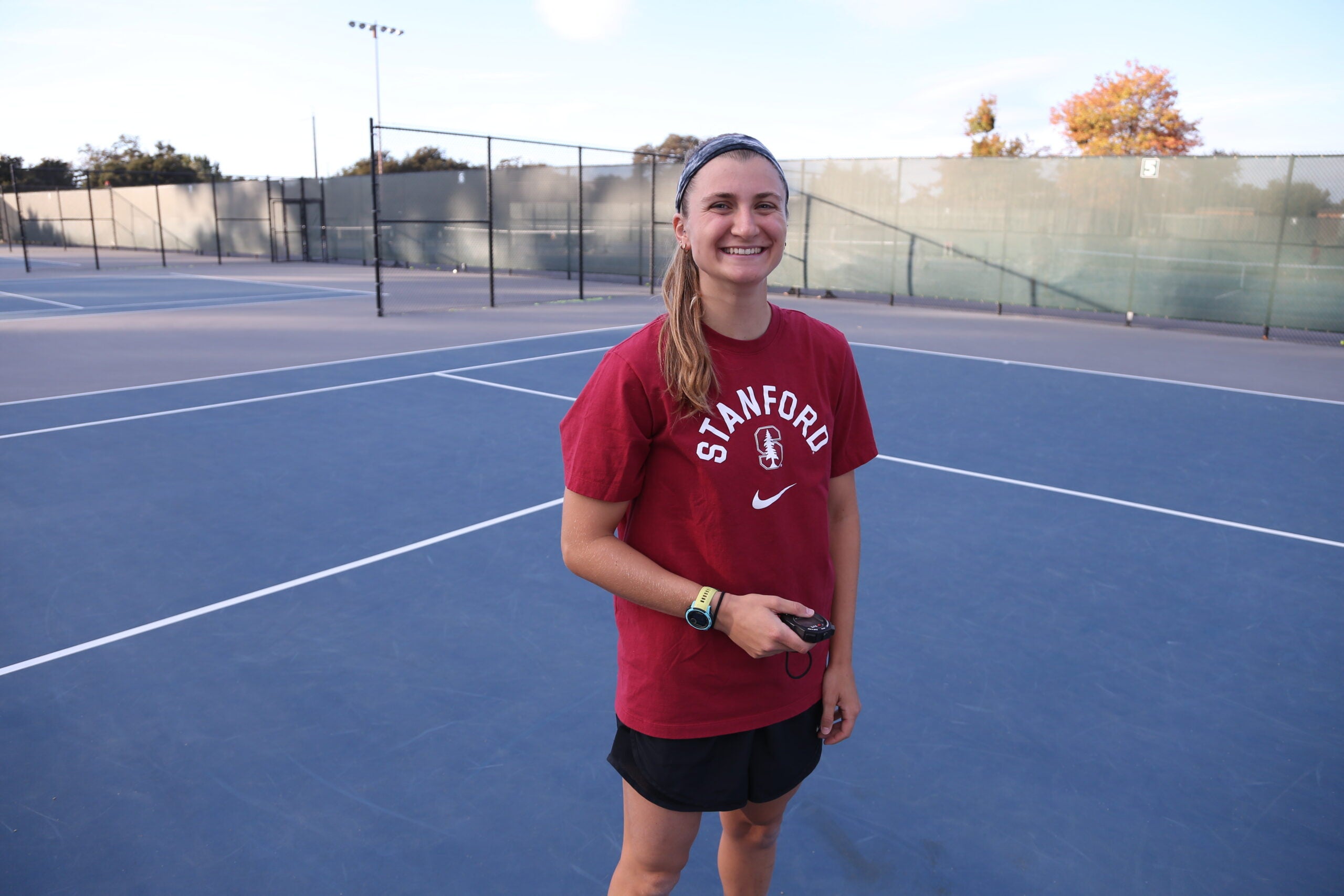An often overlooked member of athletic coaching staffs are strength and conditioning coaches.
Tasked with building up athlete stamina, directing weight training and conditioning, and developing injury prevention plans, strength coaches have a lot on their plates — often working with a handful of sports programs at once.
A 2022 UCLA Transformative Coaching and Leadership graduate, Genny Tripler has run the fitness gamut. From NCAA strength intern to a coach for the United States Paralympic and Olympic Teams, she’s mentored hundreds of high-performance athletes over the past decade, following a successful collegiate swimming career at Ithaca College.
Now at Stanford, following a stint at UC Santa Barbara, Tripler serves as the strength and performance coach for the Cardinal’s women’s tennis, women’s gymnastics, and men’s swimming teams. Between training sessions at Stanford, Tripler took a moment to speak with the School of Education and Information Studies about her coaching philosophy and athletic leadership:
Your coaching career began as an intern at UCLA. How did you get to where you are now?
After UCLA, I took a position with the U.S. Olympic and Paralympic Committee. First I was at the U.S. Olympic and Paralympic Training Center in Colorado Springs working primarily with paralympic athletes. After about a year I had the opportunity to make a move within the organization and shifted gears to working with the senior national teams for men’s and women’s indoor volleyball and women’s water polo in the Anaheim-Long Beach area.
From there, I took a position at UCSB, working directly with men’s and women’s swimming, men’s and women’s water polo, men’s volleyball, and sprinters, jumpers, and hurdlers from track and field. I worked with around 160 athletes in total.
Now, at Stanford, I’m working with some new sports teams, like tennis, that I’ve never gotten to lead before.
What is the difference between training Olympic/professional versus collegiate athletes?
The transition from the collegiate athletics world to the professional setting was definitely an adjustment. And then going from that back into the collegiate world required an adjustment period as well.
When I was at the Olympic & Paralympic Training Center, I worked with a lot of smaller groups of athletes, and the training was very individualized, with every individual being very different. With a collegiate or Olympic volleyball team, for example, I might create three or four different programs for different position players. However, with professional paralympic athletes things need to be particularly individualized because although they might all be alpine skiers, many have different impairments, all of which present differently for each athlete.
Then, I found myself transitioning back to larger groups with sports like volleyball and water polo. The athlete load at UCSB was something I hadn’t ever experienced before. It was a real challenge but it was a growth opportunity as well. You have to plan for the group as a whole, but you also have to hone in on each athlete and analyze their strengths and weaknesses.
With professional athletes, you’re often working with individuals who have competed at a high level for years or even decades. Whereas with college athletes, sometimes you have players who have never set foot in a weight room. So you’re taking a much different approach depending on their prior exposure.
What are some ways in which you incorporate transformational coaching and leadership practices in your current role?
I want to inspire and empower others, and pass along the knowledge I have learned and wish I knew earlier. I also try to utilize the weight room as a mechanism to help student athletes develop skills for life- from the practical aspects of training and recovering, to the mental aspects such as committing to goals, believing in your abilities and building mental resiliency.
For example, most of the time before a training session I don’t set up a lot of equipment for the athletes. This is because I want my athletes to be self-sufficient and able to walk into any weight room, whether they are traveling on vacation or when they are no longer a collegiate athlete, and feel comfortable and confident navigating that space and equipment. When it comes to life after sport, I want them to have genuinely enjoyed their experience around lifting and I want them to have the tools and knowledge to continue training in some capacity, and see it as a way or option to maintain their health far beyond their four years here.
I also really make an effort to get to know my student athletes as people first, player second. Athlete is just one identity or facet of what they enjoy doing, and I really care about their well being and success holistically beyond just their sport performance. I take my responsibility as a leader and coach seriously, and really try to make a positive impact as a potential role model, mentor, and strong pillar of support for those I get to work with.

Did you have a favorite class in the Transformative Coaching and Leadership program?
The values and topics we learned about in TCL that were woven into the curriculum are still very much a part of who I am and the type of coach I want to be.
I really enjoyed our class with Dr. Kenny Donaldson — Diversity Leadership in Sports and Athletics. I hadn’t studied a lot of the topics we tackled in that course before. We looked a lot at sports management and how race and identity factor into athletics, and I still think about the discussions we had after reading books that are still on my bookshelf. That class in particular helped me think through decisions I make as a coach and helped to give me a greater perspective.
And the guest speakers we had every week in TCL classes were amazing. Our instructors must’ve really pulled some strings because we got to hear from some incredible leaders.
Jill Ellis, the former coach of the women’s soccer national team, and Dawn Staley, legendary current coach of the women’s basketball team at the University of South Carolina, spoke to us one week and I was just in total awe.
It’s one thing to read about these seasoned leaders and what they’ve accomplished. But to hear them speak and be able to actually converse with them — that was something special. Great coaches are great leaders in whatever sport or discipline they are in, so I am always eager to hear and learn about their experiences and tactics they use to create a great team culture. Additionally, as a strength coach, the better relationship I have with the coaches I work with, the better I can help the athletes and teams I serve.
A native of Rochester, New York, Tripler was a freestyle sprinter during her swimming days at Ithaca College. At Sutherland High School she was an Academic All-American, helping her team to a Section 5 Championship and No. 1 ranking in New York State. Prior to her time at UCLA, Tripler also served as a volunteer Strength and Conditioning coach at Cornell University. She is a certified NSCA Strength and Conditioning Specialist, and Performance and Sport Scientist. She is also a certified USA Weightlifting coach.
